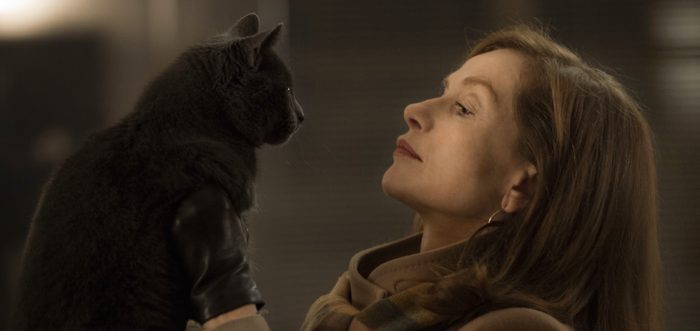
Paul Verhoeven’s first feature in ten years is a brutal film. Elle’s twisted narrative opens with catalysing violence, as Michèle LeBlanc (Isabelle Huppert) is raped by a masked intruder in her large Parisian house. The shocking sounds play over a blank screen for a few seconds before the opening shot appears: a close-up of Michèle’s cat, overlooking the scene impassively before its gaze drifts elsewhere. After the assailant leaves, Michèle’s response is remarkably neutral. She cleans the room and bathes, choosing not to report the attack to the police. She only talks to her friends and family about the assault days later, casually announcing it at the dinner table before the already-ordered champagne is popped.
The resilience shown by Michèle in response to this event, and to further, escalating psychological and physical harm, is the fascinating core of this dark, and frequently hilarious, thriller. Entirely unwilling to be victimised by the abuse enacted against her, Michèle seeks out her attacker. In flashbacks to the traumatic event she mentally reintegrates the scene into a new power dynamic. During one involuntary recollection she imagines bashing his head in, cutting back to her shocked face she emits a small smile. Later, where the film makes its most controversial and belief-suspending move, the scene is reintegrated as a masochistic sexual fantasy. What begins as a whodunnit shifts into a complex narrative ride through one indomitable character’s struggle against abuse, a psychological thriller premised on a resolute aversion to fetishising victimhood.
Michèle’s work and family life is no safe haven. She maintains a friendship with her ex-husband, a failed writer who begins a relationship with a younger woman. Her blunt responses to this and other unwanted developments supply some of the film’s funniest moments—upon hearing about the new love interest, she remarks “I was never worried about the blonde with big tits. A woman who has read The Second Sex will chew you up and spit you out.” Her wimpish, financially dependent son wants to move into an apartment with his prickly girlfriend. Michèle mocks him for being a cuckold (another dry joke: “Are her boyfriends also moving in?”). Her mother is a source of embarrassment, living with a young gigolo and spending money on plastic surgery, a lifestyle she derides as grotesque. Michèle works as the head of a video game company, business partners with an old friend whose husband she is also sleeping with. Also in the mix: Michèle befriends her neighbours, a polite religious couple, and ignores pleas from her mother to visit her estranged, imprisoned father, Charles LeBlanc. He is a source of primal trauma, a ‘monster’ notorious for committing a demented, murderous rampage in the 1970s.
The film’s deft manoeuvring through these multiple threads, which even converge into the kind of manic dinner party sequence you would find in a far more conventional comedy, is a bravura achievement. It never feels slow or overly long during its two hours-plus runtime, testament to Verhoeven’s mastery of tone and the fascinating presence of its lead. Huppert’s performance is phenomenal, building on some major roles from recent years depicting complex and sympathetic psychological portraits of perverse characters, including The Piano Teacher and Abuse of Weakness. Her aloofness somehow magnetises: alternating between an inscrutable ice-cold toughness and fugacious glimmers of cruel humour, sexual arousal or base terror. Subtle and powerful, Huppert once again humanises a difficult and remote character well beyond the range of safe filmmaking.
Michèle’s decision to engage in a psychosexual power struggle with the rapist is a conceit that may exceed good taste for some. While the film certainly doesn’t condone sexual violence it doesn’t seek to explore the subject through moral condemnation, a move out of step with contemporary liberal norms and undoubtedly the main reason Verhoeven struggled to make the film within Hollywood. Its treatment of the subject is intelligent, however, as the impacts of abuse are registered as relational. All the characters are implicated in acts of cruelty, to various degrees.
Verhoeven’s particular ability to subvert, amplify and modulate the tone of the exploitational material from genre film into intelligent and entertaining features is employed in a new mode here. The film’s humourous turns are pure dry irony and its violence grounded in naturalist shock rather than the hyperbolic gore of Starship Troopers or Robocop. Instances of sensationalist violence are instead reserved for other media within the film. At work, Michèle is overseeing the production of a bizarre and sadistic platformer featuring an ogre performing animations of brute violence and rape imagery between levels. In a production meeting she rallies the programmers with a mission statement: When the game avatar kills someone she wants the player to “feel the blood in their hands.” In addition, a documentary about her father, seen briefly on a television, features lurid crime scene recreations and the piercing tabloid image of herself as a shocked child, staring blankly at photographers. The exploitative violence of these different media offset the naturalism of the main narrative and stabilise its wild turns. The elements of sadism pervading popular media and the public sphere blunt a moral condemnation of the film’s lead characters, suggesting that there is a universal element of perversity in the world at large.
It all amounts to Paul Verhoeven’s best film since Showgirls and a triumphant return to feature filmmaking. His ongoing relationship with producer Saïd Ben Saïd, who has also funded recent late career films by David Cronenberg and Brian De Palma, is a promising prospect given that the filmmaker’s audacity, humour and directorial acumen clearly remain intact. Verhoeven’s latest film is a rare achievement: brazenly treading a difficult amoral line without trivialising its subject matter. Elle is a genuinely thrilling experience that offers its audience an intelligent, unconventional treatment of contemporary social taboos.
Around the Staff:
| Conor Bateman | |
| Jessica Ellicott | |
| Dominic Barlow | |
| Jaymes Durante |
